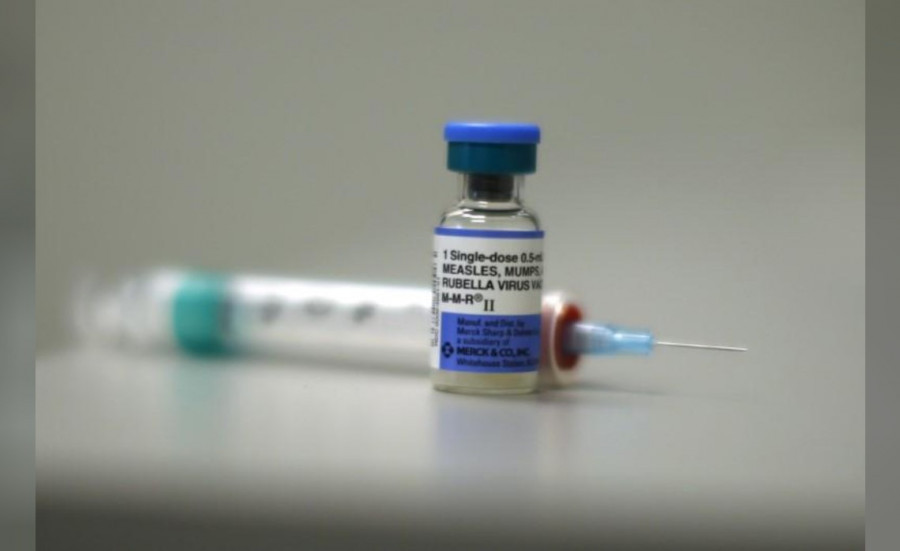Health
MR vaccine drive pushed back
The nationwide measles-rubella inoculation campaign was planned for this year.
Arjun Poudel
The national campaign against measles and rubella virus, which was slated to start in December, is set to be delayed, as aid agencies that support the drive have not been able to do a capacity assessment of provincial and local governments.
The nation-wide campaign against the deadly viruses is going to be held for the first time after the implementation of federalism and three tiers of government—federal, provincial and local. With the implementation of the federal system, responsibilities to carry out drive have also been transferred to provincial and local level governments.
“Aid agencies conduct a capacity assessment before providing the vaccine for the drive,” Dr Bhim Singh Tinkary, director at the Family Welfare Division under the Department of Health Services, told the Post. “We can hold the campaign only next year [2020], as the aid agencies have not yet completed the assessment.”
Earlier, the Ministry of Health and Population had planned to launch a measles-rubella drive throughout the country by 2019 under which children from nine months to five years of age would be immunised with anti-measles and rubella vaccines. The drive is supposed to cover over three million children.
With the help of aid agencies and the United Nations, the Ministry of Health and Population has been launching a nation-wide campaign against the deadly viruses in every four years. The Global Alliance for Vaccines and Immunizations provides free measles and rubella vaccines through UNICEF.
Tinkary said that the mass campaign against the two viruses is needed in every four years, as the coverage of the vaccines in the routine immunisation was low.
Out of over 650,000 children in need of measles-rubella vaccines every year, 120,000 (about 20 percent) miss their inoculation schedule.
Doctors say chances of the deadly viral disease spreading are higher even if one child misses immunisation. Coverage of the vaccine is less than 40 percent in some districts.
In the fiscal year 2017-18, the coverage rate of the second dose of measles and rubella vaccines was only 35 percent in Sarlahi and 46 percent in Rautahat districts. In the same fiscal year, Manang and Lalitpur districts had 45 percent coverage rate each, whereas Kathmandu had just 46 percent, according to the immunisation section.
“We feared an outbreak of viruses in some districts due to the delay in launching the campaign,” said Tinkary.
The government provides two doses of measles vaccines to children—at nine months and 15 months—free of cost from health facilities across the country.
“Chances of an outbreak of the virus will be high when there is low vaccine coverage rate,” said Dr Jhalak Sharma, chief of immunisation section at the division.
Earlier, the government had committed to eliminating measles and rubella by 2019 from the country. But due to frequent outbreak of contagious diseases, and a number of children missing the vaccines grow significantly, the ministry has been mulling over extending the deadline. This year, outbreaks of contagious diseases were reported from Morang, Dang, Kapilvastu, among other districts.
Low vaccination coverage, floating population, lack of public awareness about the importance of vaccines and apathy on the part of government agencies concerned are some of the reasons behind regular outbreaks of measles in different parts of the district.
Sharma said most of the measles outbreak cases in the districts take place in Muslim and backward communities where the level of awareness about the importance of regular immunisation is very low.
Measles and rubella are contagious viral diseases, which are transmitted through droplets from the nose, mouth or throat of infected persons. Early symptoms, which usually appear 10-12 days after infection include high fever, runny nose, bloodshot eyes and white tiny spots inside the mouth. Several days later, a rash develops on the face, upper neck and other parts of the body.
Doctors say people of all age groups are vulnerable to the disease and underage children, pregnant women, elderly people and those with compromised immune systems—HIV infected people—are highly vulnerable. Some people may suffer from severe complications, such as pneumonia, encephalitis and the infection could also lead to death among.
Measles was endemic in Nepal, with an average of 90,000 cases recorded every year from 1994 to 2004. Routine measles vaccination began in the country in 1979 with three districts. The campaign was expanded nationwide after 10 years.




 14.24°C Kathmandu
14.24°C Kathmandu















